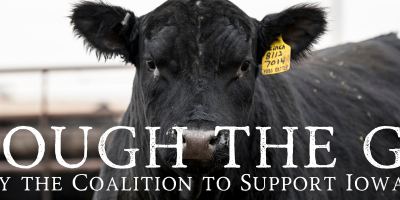CSIF Tips of the Month – April 2015
04-13-2015 in Through The Gate
Blue and Gold Pride
FFA, Agriculture Important to Iowa
Agriculture is a big deal in Iowa, employing 21% of the state’s workforce and contributing 33% of the state’s total economic output. As employment in the ag industry continues to grow, it’s important to have young people who are excited and passionate about agriculture, but also have experience in the industry.
FFA programs throughout Iowa are helping to do just that – train and motivate young people to be leaders in the ag industry. For example, the Vinton-Shellsburg ag education program recently built a new facility to provide students with hands-on experience working with livestock. Read more about it here.
CSIF to Attend State FFA Leadership Conference
The Coalition is excited to attend this year’s Iowa FFA Leadership Conference. The event will be held April 20-21 in Ames. CSIF will be surveying members to gauge their interest in ag careers and farming. There will also be opportunities for students to share positive messages about agriculture’s economic contributions to the state. Follow along by searching #IowaAgFacts.
If you know an FFA member or ag instructor attending the conference, encourage them to find our booth. (We’ll have candy bars!)
Rules and Regulations Highlight
Understand All the Rules When Utilizing EQIP Money for Livestock Projects
The Environmental Quality Incentives Program (EQIP) is a voluntary program that provides financial and technical assistance to agricultural producers through contracts up to a maximum term of ten years in length. These contracts provide financial assistance to help plan and implement conservation practices that address natural resource concerns including opportunities to improve soil, water, plant, animal, and air resources on agricultural land when constructing new livestock facilities.
Participation in EQIP results in a contract between the NRCS and a farmer. When working with EQIP projects, be sure you understand all of the requirements associated with the EQIP contract. Ask for a thorough explanation of all the rules that will need to be met in order to qualify for and keep the financial assistance. A few of the issues you should pay special attention to include: whether you will be able to keep any of your existing open lots; whether you can spread manure during the winter months and the amount of storage necessary to last through the winter; how long you will need to keep a Comprehensive Nutrient Management Plan and record-keeping documents on file (as compared to the state required plan); what paperwork and approvals are required before you are allowed to do any site preparation work; and, whether there are any specific construction requirements for the new building or storage.
In addition to meeting NRCS standards, you will also need to meet all state and federal rules and regulations that apply to open feedlots or confinement barns. It is recommended that you contact CSIF and determine if a new livestock facility can be sited on your farm before agreeing to the EQIP contract. For more information contact the Coalition at 800-932-2436.
Farmgate Quotable
“Thanks to the Coalition, my wife and I received the assistance we needed to move forward and grow our Story County livestock farm. I’m glad we called the Coalition when we wanted to develop a proactive plan for growing our farm with livestock.” – Lucas Tjelmland, Story County Pork Producer
Recommended News

Through the Gate // May 2025
Stay updated with the Coalition to Support Iowa's Farmers. Discover events and more.
Read More
Through the Gate // April 2025
Stay updated with the Coalition to Support Iowa's Farmers. Discover events and more.
Read More
Through the Gate // March 2025
Stay updated with the Coalition to Support Iowa's Farmers. Discover events and more.
Read More